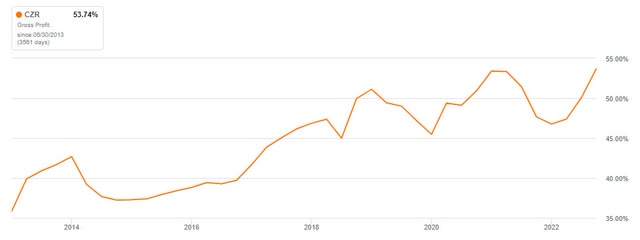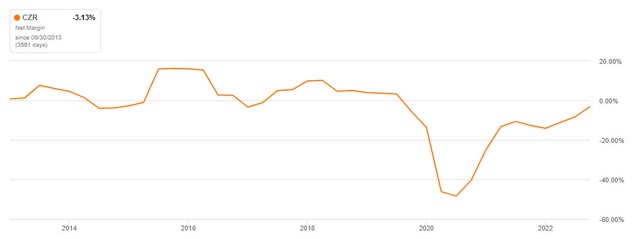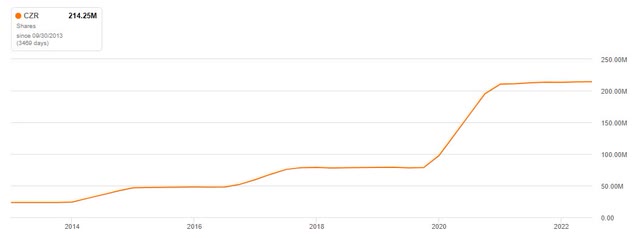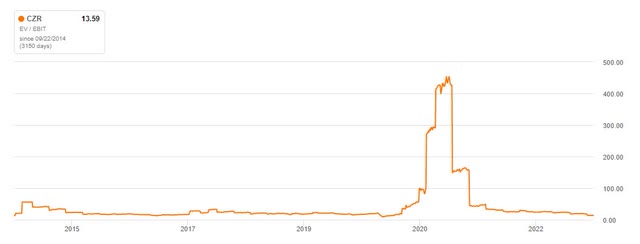Caesars Entertainment: Capital Allocation Is The Elephant In The Room

Summary
- Most people put a lot of emphasis on the high level of debt, but this should not be the main cause for concern.
- However, I believe that future cash flows will be sufficient to reduce debt to a healthy net debt level for the industry.
- I am more concerned about the return on capital they have been able to generate over the last few years.
Marcin_P_Jank
Thesis
Personally, I like to invest in companies in the gambling industry because it is an addictive product and the games are designed to give the house an advantage so they cannot lose money on their games in the long run. This results in a business where, to some extent, even a poor management team can achieve good results.
Unless the management team is completely incompetent, the house advantage should result in businesses that generate strong and steady free cash flows. Caesars (NASDAQ:CZR) is one of the best known companies in the industry, with a lot of good assets, but it is struggling because of debt and, sadly, poor capital allocation. And so I would take a watch-and-wait approach to see if they can improve and turn their business around.
Analysis
Caesars Entertainment Q1 Results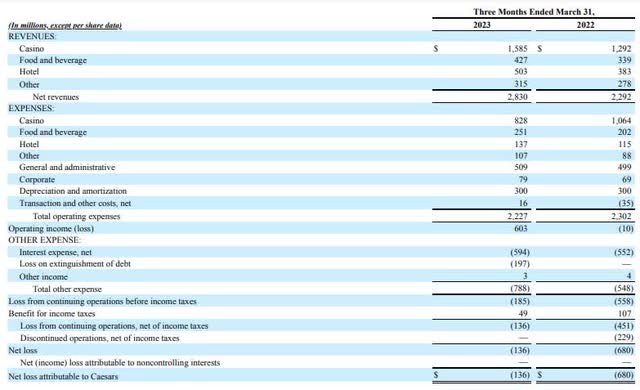
Caesars released its Q1 results last week and they were quite good. Net revenues were up 23.5% year on year and expenses were down 3.3% year on year. Revenues improved due to the lifting of COVID restrictions and the resulting high occupancy rate of 95% compared to 83% in the previous year. And because of the high demand, hotels can attract higher value customers.
The decline in expenses looks good at first glance, but most of it is because there were significant advertising costs in the first quarter of 2022 due to the digital segment, and these fell away in the last quarter. So when we look at the other non-casino expenses, we see small increases almost everywhere, obviously also due to inflation.
Nevertheless, the operating result was positive in 2023, demonstrating the year-on-year improvements. But then there is the interest expense, which is a problem and leads to a net loss. In 2022, it was $552 million, compared to $594 million in 2023.
Caesars Entertainment Q1 Results
And the increase in interest payments is because some of the debt is variable and therefore increased with rising interest rates and the VICI lease is also CPI based. In terms of long-term debt maturities, a large portion is due in 2025. However, management is really focused on deleveraging, targeting $1bn of debt reduction in 2023 and hoping to achieve the same in 2024 and 2025. So I would argue that debt, as the most obvious issue, should not be the main concern as the company is likely to return to a healthy net leverage in the future.
In a normalized environment, FCF should be more than sufficient to pay down debt quickly and, once that task is complete, to return cash to shareholders via buybacks or dividends. The Digital division is also almost entirely self-funded and the launch of the I-Casino app in the third quarter, together with the entire Digital division, should provide a further boost to FCF in the future.
Growth opportunities
In general, the company has many opportunities for future growth. The expansions at Harah´s Hoosier Park and in New Orleans as well as the temporary facilities in Danville and Columbus in Q2 should lead to further growth. The digital segment, with its sports betting and casino offerings, also has plenty of room to grow.
However, it is important to recognize that the gaming market, and especially the digital market, is highly competitive. Still, the expansions should have a positive impact on revenues, and the increase in online gaming revenues could really help to improve margins in the future. Together, these two catalysts should lead to positive results in the coming quarters. The I-Casino app also has the ability to really improve business metrics in the third quarter and provide a more favorable business outlook for Caesars. And after the debt reduction, my priority would be to try to use the capital as efficiently as possible.
Competitive Advantage
I think Caesars has a bit of a competitive advantage in the brick and mortar casino segment because of their brands and because they have the largest loyalty program in the industry. And that could be very useful for their online market as well, because they can leverage that.
Capital Allocation
I think capital allocation is the biggest issue at the moment. The 5-year annual ROIC is only 2.84% and this clearly shows that capital allocation has not been efficient in the past. And this problem existed before COVID. However, the return on capital will probably increase a little bit in the near future and I could see them achieving a 5-year average over the next few years, which is somewhere in the 6-8% range.
Some of their competitors have ROICs in excess of 20%, allowing them to reinvest capital more efficiently and grow faster and more profitably. And as I am one of those people who believe that long-term returns follow return on capital, I would say that this is a bad situation for Caesars because they really need to improve ROIC. They have plenty of investment opportunities, but they need to make a decent return on them, and a 2.84% ROIC is below the cost of capital. And to create value, ROIC needs to be above the cost of capital. And even if they increase their ROC to 6-8%, this is barely above the cost of capital and will result in minimal returns on capital.
However, there are clear signs of improvement as gross margins have improved over the last 10 years. Although net margins have been hit hard by COVID, this should be temporary as they are on an upward trend and on a normalized basis should be in line with historical margins.
Another important issue is that the increase in outstanding shares has led to dilution for existing shareholders and therefore future buy-backs would be important for shareholders. But the first priority is to reduce debt.
As I believe that EV / EBIT is a good measure of whether Caesars' shares are over- or undervalued, I would say that they are currently fairly valued at 13.59x and roughly in line with historical EV / EBIT.
Conclusion
Caesars, like most of its competitors, has been hit pretty hard by the COVID restrictions, so some of the industry players are like a turnaround story. But Caesars has all the ingredients for future success: a well-known brand in a market protected by barriers to entry and a highly addictive product. And I would say that their loyalty program could be one of their best assets because of the large number of participants. Also, I think the debt problem will be temporary because they have enough cash flow to pay back a good part of it rather quickly. But I think the low return on capital will be a problem in the future. That is really where they need to improve.
Efficient use of capital would really improve future prospects, but on current figures I would say they are somewhere in the low single digits of future annual total returns over the long term.
This article was written by
Analyst’s Disclosure: I/we have no stock, option or similar derivative position in any of the companies mentioned, and no plans to initiate any such positions within the next 72 hours. I wrote this article myself, and it expresses my own opinions. I am not receiving compensation for it (other than from Seeking Alpha). I have no business relationship with any company whose stock is mentioned in this article.
Seeking Alpha's Disclosure: Past performance is no guarantee of future results. No recommendation or advice is being given as to whether any investment is suitable for a particular investor. Any views or opinions expressed above may not reflect those of Seeking Alpha as a whole. Seeking Alpha is not a licensed securities dealer, broker or US investment adviser or investment bank. Our analysts are third party authors that include both professional investors and individual investors who may not be licensed or certified by any institute or regulatory body.
